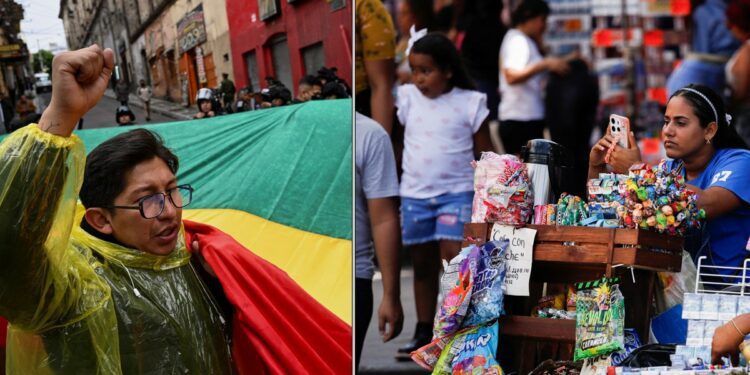As Bolivia and Venezuela falter under economic and political strain, South America’s broader crisis intensifiesread more
South America, a continent abundant in natural resources, is grappling with economic crises that expose the fragility of its political and economic frameworks. Two glaring examples, Bolivia and Venezuela, reveal the vulnerabilities of resource-dependent economies. While each country faces unique challenges, their crises share common roots in economic mismanagement, resource dependency and political turmoil.
Bolivia: Decline of a natural gas giant
Once hailed as a success story for resource-led development, Bolivia is now reeling from declining natural gas production. For decades, natural gas exports underpinned Bolivia’s economy, contributing significantly to government revenue and public spending. However, years of underinvestment in exploration and extraction have led to a precipitous fall in production. By 2023, the country’s natural gas exports had plummeted by nearly 40 per cent from their peak, weakening its trade balance and depleting foreign reserves.
Economic turmoil has been compounded by political instability. President Luis Arce, struggling to stabilise the economy, faces growing resistance from both opposition forces and factions within his own party. The internal rift with former president Evo Morales has created a political deadlock, stalling necessary reforms. Meanwhile, social unrest grows as inflation rises and essential goods become scarce, eroding public confidence in the government’s ability to manage the crisis.
Venezuela: A cautionary tale of oil dependency
Venezuela’s economic collapse is perhaps the most dramatic in the region. With the world’s largest proven oil reserves, the country once enjoyed immense wealth. However, over-reliance on oil exports, combined with years of corruption, mismanagement and international sanctions, has decimated its economy. The collapse of global oil prices in 2014 marked the beginning of Venezuela’s downward spiral, which has since been exacerbated by US sanctions targeting the Maduro regime.
Hyperinflation, which peaked at an astounding 1,700,000 per cent in 2018, has devastated purchasing power, while basic goods and medicines remain scarce. An estimated 7 million people have fled Venezuela, creating one of the largest migration crises in modern history. President Nicolás Maduro’s authoritarian grip has stifled dissent but failed to address the economic root causes. This has left the country trapped in a cycle of stagnation and repression.
Common patterns
The crises in Bolivia and Venezuela highlight the dangers of resource dependency. Both nations relied heavily on the export of hydrocarbons—natural gas in Bolivia and oil in Venezuela—to fund their economies. When global commodity prices fell, their revenues dried up, exposing structural weaknesses. In both cases, governments failed to diversify their economies, leaving them vulnerable to external shocks.
Political instability has exacerbated economic challenges. In Bolivia, the internal power struggle between Arce and Morales has paralysed governance, while in Venezuela, Maduro’s autocratic rule has alienated international allies and exacerbated economic isolation. In both nations, corruption and mismanagement have squandered public resources, deepening the crises and eroding public trust in institutions.
Diverging responses
Despite their similarities, Bolivia and Venezuela differ in their responses to the crises. Bolivia’s government, under Arce, has made attempts to stabilise the economy by seeking foreign investment and diversifying exports. However, these efforts have been undermined by political infighting and insufficient infrastructure to support new industries.
In contrast, Venezuela’s Maduro regime has largely relied on authoritarian measures to maintain power including suppressing dissent and controlling access to scarce resources. The country has recently sought to bypass sanctions by strengthening ties with nations like China, Iran and Russia. While this has provided some short-term relief, it does little to address the structural problems plaguing the economy.
Lessons for South America
The crises in Bolivia and Venezuela offer critical lessons for the rest of South America. Bolivia and Venezuela stand as stark reminders of the perils of resource dependency and political mismanagement. Their ongoing crises highlight the need for comprehensive reforms, both economic and political, to build resilient and inclusive economies. As South America looks toward the future, the choices it makes today will determine whether the continent emerges stronger or remains trapped in cycles of fragility and unrest.
Source link : http://www.bing.com/news/apiclick.aspx?ref=FexRss&aid=&tid=67487fe32254470f8cb1dba701e9f4bb&url=https%3A%2F%2Fwww.firstpost.com%2Fworld%2Fwhat-south-america-must-learn-from-bolivia-and-venezuelas-economic-crises-13839741.html&c=12673211469504562658&mkt=en-us
Author :
Publish date : 2024-11-28 00:55:00
Copyright for syndicated content belongs to the linked Source.








